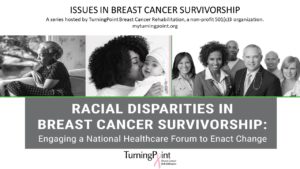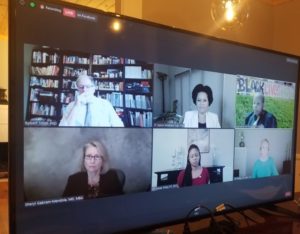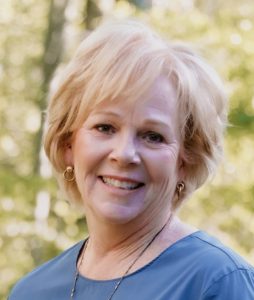By Guest Columnist JILL BINKLEY, program director and founder of TurningPoint Breast Cancer Rehabilitation
Functional limitations and issues such as numbness, decreased shoulder range of motion, weakness and reduced aerobic capacity are common side effects for breast cancer patients following surgery.
More than 20 percent of breast cancer survivors also develop lymphedema – chronic arm swelling – a potentially long-term side effect that can lead to reduced quality of life, activity restrictions and cosmetic concerns.
Survivors are often unaware of the adverse impact of their life-saving treatment and express shock that pain, fatigue and impaired upper extremity movement may persist for years after a breast cancer diagnosis. In fact, many survivors hesitate to self-advocate with the belief that disabling effects are a normal part of breast cancer treatment.
Taken together, the physical toll, financial burden of treatment, limitations on ability to work, role disruption and elevated emotional anxiety place intense strain on the patient and their entire family.
Research is clear that rehabilitation, including exercise, improves quality of life and reduces or prevents treatment-related issues, but it is estimated that less than 20 percent of cancer survivors receive this care. That same research also shows that early detection and management through prospective surveillance reduces progression of lymphedema and the impact to the survivor and cost to the healthcare system.
The American Cancer Society and Atlanta-based nonprofit TurningPoint Breast Cancer Rehabilitation examined the game-changing role rehabilitation and exercise can play in a breast cancer patient’s journey toward a full recovery and collaborated in an article that appeared in acsjournals.
To illustrate the struggles of a breast cancer journey, and how integrated rehabilitation and exercise fit into a patient’s recovery, one survivor agreed to share her story:
- Stevie Gonyon is a 35-year-old Black woman diagnosed with triple negative breast cancer, a particularly aggressive form. She had a mastectomy, reconstruction radiation and chemotherapy. For more than a year, Stevie experienced significant long-term effects from the cancer treatment, including cancer-related fatigue, pain and difficulty with activities of daily life. She was eventually referred to TurningPoint and evaluated by a physical therapist who specialized in breast cancer rehabilitation.
- She works in insurance sales but was not working due to COVID-19. The physical therapist found that Stevie had pain in her chest wall and arm, poor movement of her shoulder and was at high risk for developing lymphedema in her right arm. These issues affected daily tasks such as getting dressed, and she had difficulty sleeping and returning to her usual exercise.
- Stevie participated in physical therapy through telerehabilitation and in-person visits. She also joined TurningPoint’s virtual education and exercise sessions. Over the next weeks, Julianne’s arm mobility increased, while pain and fatigue decreased. She was coached through her return to exercise and understood how to self-monitor for lymphedema. In the case of swelling, she was prepared to facilitate early treatment.
Survivors are additionally marginalized when race or socio-economic status is a factor.
Disparity in survivorship is well-documented in the Black community. In a study published in 2016, TurningPoint partnered with Grady Memorial Hospital to analyze the physical and functional issues in Black women during breast cancer treatment.

Three upcoming webinars hosted by TurningPoint Breast Cancer Rehabilitation are to provide insights, and steps toward solutions. Credit: TurningPoint
We found that more than 30 percent of the women experienced significant issues following surgery. Outside of the study, most of these women would not be referred for rehabilitation care to address these issues. Other research suggests that Black women encounter more physical impairments related to breast cancer than their white counterparts even when access to care is equal. Black and low-income women are almost twice as likely as white women to have lymphedema. Finally, the negative impact on the ability to work following breast cancer treatment has been shown to be greater for Black survivors.
Despite research and recommendations supporting rehabilitation and exercise during and after breast cancer treatment, few people receive this essential survivorship care. National and global barriers include a dearth of specialized oncology physical therapists and community-based specialty clinics as well as lack of established collaboration among oncology healthcare providers and rehabilitation providers. Barriers are magnified in Black survivors due to systemic racism, healthcare provider bias and discrimination, lack of culturally relevant care models and socio-economic barriers.
The compounded effect of universal barriers to breast cancer rehabilitation, more serious survivorship issues in Black women, and additional race-based barriers result in consequential health inequity for Black breast cancer survivors. This mirrors well-documented and historical health disparities that lead to poorer health outcomes for Black Americans. In 2020 it is playing out during COVID-19 with an undeniable disproportionate burden of disease in the Black community.
There is consensus that current delivery models for cancer survivorship care may be unsustainable and fail to meet the diverse needs of cancer survivors. TurningPoint is forging a path to reducing racial disparity locally and nationally. As a nonprofit, TurningPoint turns away no patient due to financial constraints. Community-based models of care, such as TurningPoint’s clinic, and the incorporation of technology, improve access to care for all Americans and reduce disparity in survivorship care for Black women and men.
In March 2020, TurningPoint pivoted to add telerehabilitation and virtual live survivorship education and exercise classes to safely serve our high-risk breast cancer patients during the pandemic. We have found that telerehabilitation and virtual live group survivorship education provide an alternative or adjunct to in-person breast cancer rehabilitation care, thus improving access and delivery to underserved populations. TurningPoint has emerged as an international leader in implementing telerehabilitation for breast cancer patients as an effective and feasible alternative that reduces geographical and socioeconomic barriers to care, such as transportation, caring for young children or time off work. Critical resources for underserved communities are being expanded and disparities in survivorship outcomes reduced. More information on this work is available in an article published in October in the journal Rehabilitation Oncology.

The first of four virtual forums to be sponsored by TurningPoint Breast Cancer Rehabilitation explored issues that contribute to racial disparities in outcomes for breast cancer survivors. Credit: TurningPoint
On the national front, TurningPoint is hosting a series of four virtual forums to engage healthcare providers and stakeholders in the breast cancer community that address racial disparity in breast cancer survivorship. Reducing gaps in survivorship care is part of TurningPoint’s mission and growing evidence of racial disparity provided the impetus to lead a national conversation to enact change. The first forum in October 2020 featured a talented panel of experts with more than 200 attendees at the live webinar. The panelists included Dr. Karen Winkfield, MD, PhD, radiation oncologist and executive director, Meharry-Vanderbilt Alliance; Dr. Lisa VanHoose, PT, PhD, associate professor,
University of Louisiana Monroe; Dr. Sheryl Gabram, MD, MBA, FACS professor of surgery, Emory University; and Dr. Janae Finley, DPT, PT, physical therapist, TurningPoint Breast Cancer Rehabilitation. The forum was moderated by Dr. Robert Smith, PhD, senior vice president, American Cancer Society.
The three follow-up forums in 2021 are to focus on the topic of Strategies and Models of Care that Reduce Racial Disparity in Breast Cancer Survivorship. National experts, including advocates, researchers and leaders in successful community-based initiatives will engage to develop grassroots solutions to effect national change. These are to be held on the following Wednesdays: Feb. 24, April 28, and July 28. Each session is scheduled from 7 p.m. to 8:30 p.m. The recording of our first event, information on upcoming events and sponsorships are available at article on TurningPoint’s website.
To join this growing initiative to reduce disparity in breast cancer survivorship as a partner or sponsor and for more information on breast cancer rehabilitation and exercise, please send us an email.
Note to readers: Jill Binkley, PT, MSc, CLT founded TurningPoint Breast Cancer Rehabilitation, in Atlanta, non-profit organization focused on improving the quality of life for all breast cancer patients.
"breast" - Google News
December 21, 2020 at 04:56AM
https://ift.tt/3p7BH36
Breast cancer survivorship: Seeking solutions to address racial... - SaportaReport
"breast" - Google News
https://ift.tt/2ImtPYC
https://ift.tt/2Wle22m
Bagikan Berita Ini
















0 Response to "Breast cancer survivorship: Seeking solutions to address racial... - SaportaReport"
Post a Comment